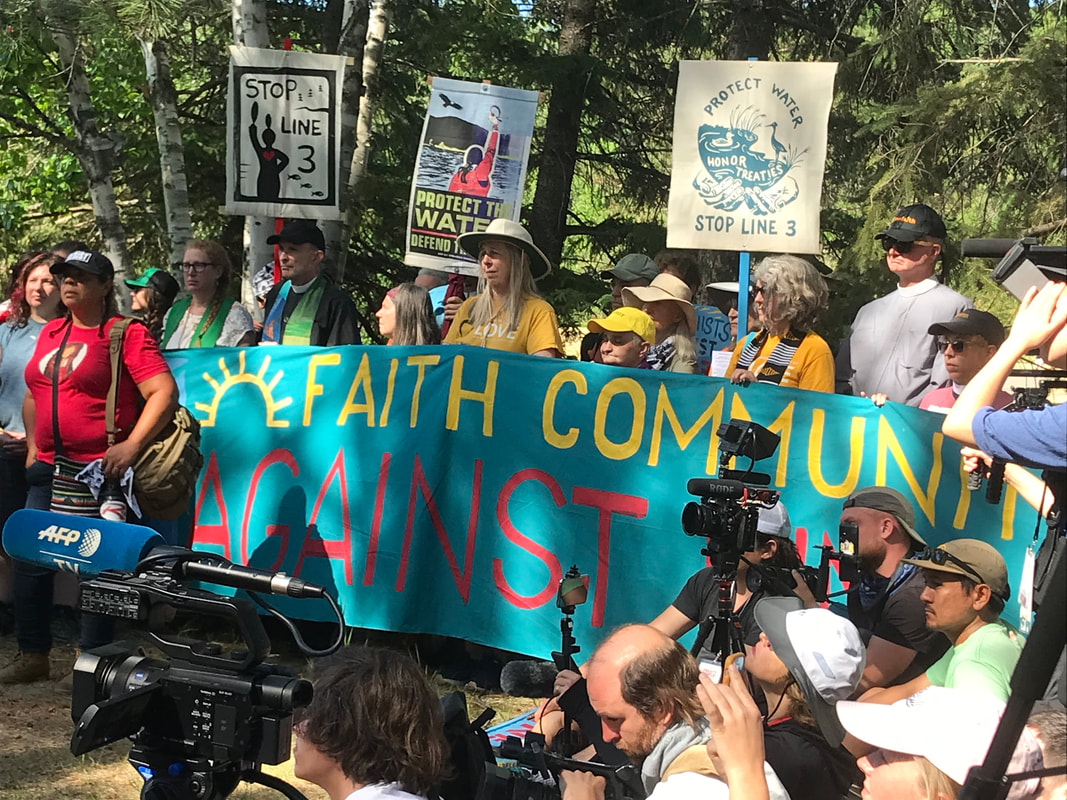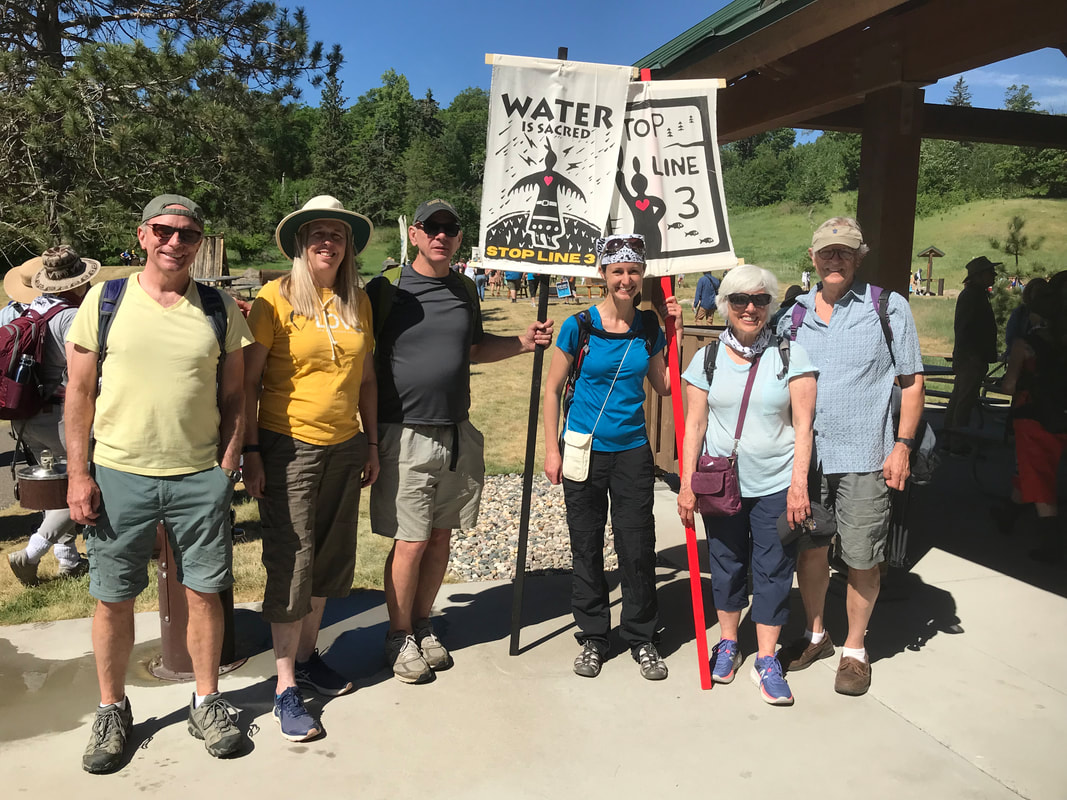|
By Jean Hammink On June 5-8, 2021, indigenous leaders in northern Minnesota called treaty people everywhere to gather on the White Earth Reservation to convince President Biden to honor treaty rights and stop the Enbridge Line 3 pipeline. Over 2,000 people from around the country answered the call and showed up for the four-day Treaty People Gathering. The term “treaty people '' was intentionally used to remind us that as citizens of the United States, we all have a responsibility to uphold the treaties our government has made. The pipeline will run through the treaty lands of four Anishinaabe tribes (White Earth, Red Lake, Leech Lake, Fond du Lac). Indigenous leaders organized this gathering after failing to stop the construction after seven years of legal battles and months of on-the-ground protest. To make a bold statement, the event enabled participants to engage in different levels of “direct action,” meaning acts of civil disobedience to delay or shut down construction, like blocking access to the construction site and getting onto construction equipment. The Stop Line 3 Campaign to Protect Treaties, Water and Climate became a priority for Unity’s Act for the Earth (AFE) community outreach ministry team in January 2020. The Treaty People Gathering called the AFE team to a higher level of commitment and action based on our commitment to “advance justice, wholeness, and equity for people, our Earth, and all life on it,” a Unity Ends Statement. Twelve people from Unity Church, ages 23-80, responded by attending the Treaty People Gathering. Claire Cooke was one of those people and she shares her reflections in the piece below. Photos by Jean Hammink Line Three – Let Us Have Hope
A Reflection from the Treaty People Gathering by Claire Cooke That day, the sun beat down hot. The sky was blue. Voices rose in chant, and song, and prayer. There was power, solidarity, and hope by the river. Let me back up and tell you where I was. On the beautiful, sunny morning of Monday, June 7, 2021, I stood on a bridge just above the Mississippi River in northern Minnesota as part of the Treaty People Gathering. This gathering was a direct action organized by indigenous women leaders who have been fighting on the front lines to protect treaty rights and the water. There, not far from the headwaters, the thin band of water below us could hardly be recognized as the rushing river it would become only a couple hundred miles south. But it was beautiful, clean, and slated to be crossed by Canadian oil company Enbridge's tar sands pipeline, Line 3. Line 3 is a “replacement” pipeline project that stretches across Canada, Minnesota, North Dakota, and Wisconsin, with 337 new miles of pipe destined for Minnesota alone. It is a pipeline that threatens over 200 bodies of water and their ecosystems, with its 20 river crossings. A pipeline that would slow our transition to renewable energy and worsen climate change, creating the greenhouse gas equivalent of 50 new coal power plants. A pipeline that violates treaty rights, and will result in more missing and murdered indigenous women. A pipeline that would leave the old pipeline that it is “replacing” to rot in the ground. That day, I, along with 12 other individuals from Unity Church–Unitarian and over 2,000 others, stood united against Line 3 as treaty people. In the United States, treaties, in conjunction with federal law and the constitution, make up the “supreme law of the land.” In the process of becoming a nation, the U.S. entered into many treaties with the native peoples of the Americas to acquire the land where we now live. When such treaties were signed in Minnesota between the U.S. government and the Ojibwe and Dakota peoples, these indigenous peoples retained many of their rights such as the right to hunt, fish, harvest wild rice, and perform spiritual practices on these lands. Over the course of U.S. history, many of these treaty agreements and the rights therein have been, and continue to be, broken. This is true with Line 3, where the pipeline threatens many treaty rights, especially the Ojibwe’s sacred practice of wild rice harvest. Treaty agreements were made between two parties: the ancestors of today's native peoples and the ancestors of many U.S. citizens. We, descendants (whether through a direct bloodline or through the inheritance of this government as U.S. residents) must now collectively honor and uphold these treaties. The Treaty People Gathering showed us that this burden rests not on one party, but on all of us, as we are all treaty people. As we gathered as allies in the days leading up to June 7, we learned about our inheritance of these treaties, about our rights, and our obligations from indigenous leaders. Then, on the 7th, we acted to uphold our end of the treaty, supporting indigenous leaders as they exercised their treaty rights and asking others, including President Biden, to honor these treaties. I have heard many times from those around me that it's hard to be motivated, that the pipeline probably won't be stopped, so there is not really a point in acting. I agree, it is discouraging to see the Minnesota Court of Appeals uphold the Public Utilities Commission’s approval of Line 3, and the Biden administration’s refusal to revoke the federal permits given to the project through the Army Corps of Engineers. Yet, this is where I ask you to have hope. The ability to lose hope, to step away from a fight unimpacted, and the option to walk away at all, are privileges. Those of us unlikely to suffer the consequences are able to lose hope when the fight is long, hard, sad, uncomfortable, inconvenient, or just too time-consuming. Those with privilege have the option to lose hope. On the other hand, the luxury of losing hope isn’t available to those most impacted, those whose way of life is threatened, and those who fear for family and friends. For them, losing hope is so much more than being sad or feeling defeated - it is threatening to their safety, their wellbeing, their way of life. The path of hope, the one that asks us to steadfastly fight the injustice we see in the world, will be a trying path, but it is also the path that Unitarian Universalism asks us to walk down. Luckily this is not a path we are asked to walk alone. We are called together to support one another and hold each other accountable, as we sweat, fumble, and rejoice in this work. Together, let us have hope. To join the Line 3 movement and find out what you can do to help, please visit https://www.stopline3.org/, https://www.mnipl.org/take-action/pipelines/, or contact Act For the Earth’s at [email protected].
2 Comments
Diane Roffler
8/26/2021 03:01:34 pm
Well written but I have a question, how does the pipeline affect the murdering of indigenous women? I must have missed something (?) in reading the article.
Reply
Clairece Cooke
9/3/2021 01:01:07 pm
Statistically, when large work projects such as Line 3 come through these communities they see a sharp increase in human trafficking and sexual violence against native women who are already facing high statistical odds for these things. https://www.stopline3.org/news/line3workkers-mmiw
Reply
Leave a Reply. |
Topics
All
Beloved Community ResourcesUnity Justice Database
Team Dynamics House of Intersectionality Anti-Racism Resources in the Unity Libraries Collection Creative Writers of Color in Unity Libraries The History of Race Relations and Unity Church, 1850-2005 Archives
July 2024
Beloved Community Staff TeamThe Beloved Community Staff Team (BCST) strengthens and coordinates Unity’s antiracism and multicultural work, and provides opportunities for congregants and the church to grow into greater intercultural competency. We help the congregation ground itself in the understanding of antiracism and multiculturalism as a core part of faith formation. We support Unity’s efforts to expand our collective capacity to imagine and build the Beloved Community. Here, we share the stories of this journey — the struggles, the questions, and the collaborations — both at Unity and in the wider world.
The current members of the Beloved Community Staff Team include Rev. Kathleen Rolenz, Rev. KP Hong, Rev. Lara Cowtan, Drew Danielson, Laura Park, Lia Rivamonte and Angela Wilcox. |

